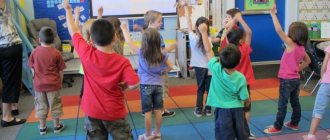Cognitive abilities of preschool children as a psychological and pedagogical problem
Characterizing the problems of psychological and pedagogical sciences of the 21st century, Academician D.I. Feldshtein says that not only the world in which a person lives has changed, but also the person himself [2]. Based on specific data obtained by scientists, the academician states that the degree of real changes in the historical situation has objectively determined the qualitative mental, psychophysiological, and personal changes of the modern child. “The modern child, while maintaining the essential foundations and effective mechanisms of consciousness and thinking, is strikingly different not only from the “Child” described by Comenius and Pestalozzi, Ushinsky and Pirogov, Zazzo and Piaget, Korczak and other great educators of the past, but is even qualitatively different from child of the 90s of the twentieth century. At the same time, the child has become no worse or better than his peer twenty years ago, he has simply become different” [1]. Characterizing the real changes in the modern child, D. I. Feldshtein speaks of profound changes in his perception, attention, memory, consciousness, thinking, the nature of his orientations and other characteristics. As a difference that comes to the fore, he names a sharp decline in the cognitive development of preschool children. At the same time, intellectual value orientations are moving to the forefront. Education, orientation towards a high level of achievement, as well as good health and presentable appearance become especially significant qualities for children and their parents [1].
From the above it follows that the acute problem of developing children’s cognitive abilities today is one of the most pressing in modern theory and practice of children’s pedagogy and psychology. Cognitive activity and cognitive abilities are a necessary condition for the formation of children’s mental qualities, their independence and initiative. The level of development of abilities to understand the surrounding world (the physical and the human world) determines the development of educational skills and social interaction skills, which will subsequently have a decisive influence on the process and result of the child’s socio-psychological adaptation to school.
At the present stage of development of pedagogy and psychology, cognitive abilities are understood as a combination of sensory and intellectual abilities of a child, based on the manifestation of cognitive activity and directly related to curiosity and knowledge of the world. The leading place in the structure of cognitive abilities is occupied by the ability to create images that reflect the properties of objects, their general structure, the relationship of basic features or parts and situations. Cognitive abilities ensure the success of any cognitive activity. Thus, cognitive abilities are an individual characteristic of a person, aimed at understanding the world around him, developing under the influence of many factors and conditions in activity.
The problem of studying the cognitive abilities of children has long attracted the attention of teachers and psychologists (Wenger L.A., Volkova S.I., Druzhinin V.M., Zaporozhets A.V., Leites N.L., Matyushkin A.N., Menchinskaya N. A., Poddyakov N. N., Skripchenko A. V., Teplov B. M., Usova A. P., Shadrikov V. D., Elkonin D. B., etc.). But only in recent years has the essence of “cognitive abilities” proper in the structure of general abilities begun to be determined, actively and specifically studied.
Age-related aspects of the development of cognitive activity and cognitive abilities were studied by such domestic specialists as Vygotsky L. S., Zaporozhets A. V., Elkonin D. B., Poddyakov N. N. and others. They argue that it is precisely in preschool age that the development of mental development, the pace of which subsequently gradually slows down. That is why children should make the most of their potential for developing cognitive abilities. In the studies of domestic scientists (A. V. Zaporozhets, A. I. Kulchitskaya, V. O. Molyako, I. V. Okhulkova, M. M. Poddyakov, N. I. Povyakel, T. V. Ulkina, etc.) More promising opportunities for the development of cognitive abilities in preschoolers, in comparison with primary school students, have also been identified.
But, despite the relevance of the issues under study, the problem of children’s cognitive abilities, their study and development, until recently, has not been sufficiently developed. Our analysis of scientific and scientific-methodological literature, as well as the experience of teachers of modern preschool educational institutions, allowed us to identify the following contradictions:
- between the increased requirements for the level of development of the cognitive abilities of the modern child and the insufficient development of early development technologies;
between the availability of modern methodological developments in the field of developmental work with preschoolers and the insufficient use of this potential by experienced teachers.
All of the above became the basis for planning and carrying out our research on the problem of identifying and describing the features of the development of cognitive abilities of preschool children.
Purpose of the study: to identify and describe the features of the development of cognitive abilities of preschool children.
To achieve this goal, it is necessary to solve a number of problems:
- Based on the analysis of scientific and scientific-methodological literature, reveal the main content of the concept of “cognitive abilities” and related concepts.
- To characterize the dynamics of the development of cognitive abilities in childhood.
- To identify the main pedagogical conditions that influence the development of cognitive abilities of preschool children in preschool educational institutions.
- Formulate practical recommendations for parents and teachers.
The research was carried out in several stages:
- Theoretical and methodological stage, including:
study of theoretical sources and advanced pedagogical experience on the problem of developing the cognitive abilities of preschool children in the process of play activities;
development of a scientific and conceptual apparatus of research and promotion of a working hypothesis;
development of a plan for the experimental part of the study.
- Practical stage, including:
carrying out organizational procedures (forming a sample of subjects, complying with formal requirements for conducting research);
implementation of empirical research;
testing and discussion of current results at meetings of the pedagogical council of the preschool educational institution.
- The final stage, including:
generalization and analysis of research results, translation of the data obtained;
development of practical recommendations for specialists in preschool institutions and parents.
The goal and hypothesis formulated at the beginning of the study had to be experimentally confirmed. To prove this, we developed a research program, which was implemented on the basis of MDOU No. 24 in Khabarovsk. The participants in the study were 28 senior group students. In addition, a preschool educational psychologist and 4 teachers were involved in the study.
The study was conducted in free time from classes, individually with each child. Among the study participants there were no children with severe psychophysical developmental disorders or special educational needs. Data from frequently ill children who did not undergo all research procedures were not taken into account when processing and interpreting the data.
In order to study the level of development of cognitive abilities of preschool children, we used a specially designed package, including four methods: “Composing a story from a picture” and “Sequential pictures” (R. R. Kalinina), “Composing a story (fairy tale)” (O. S. Ushakova), “Completing the drawing of figures” (O. M. Dyachenko). The methods allow us to determine the level of mental development (verbal and logical thinking), as well as the behavioral-effective component of cognitive abilities and cognitive activity.
Based on the results of the diagnostic procedures performed, all study participants can be conditionally divided into groups:
- Children with a high level of development of cognitive abilities are characterized by: a high degree of independence of actions and evaluation of their results, flexibility, originality, stability of interest in the content of the task, satisfaction in connection with the completion of the task;
- Children with average level cognitive abilities are characterized by: mixed orientation in perceptual actions, which varied depending on the complexity of the object, interest in attitude to the task, and the ability to objectively evaluate results.
- Children with a moderate level of development of cognitive abilities are characterized by: lack of desire for clarity, memorization and manifestation of volitional efforts, moderate originality in solving verbal problems, complications in non-verbal tasks, and the ability to objectively evaluate results.
- Children with a reduced level of development of cognitive abilities are characterized by: an indifferent attitude towards accepting the task and the result of the activity, showing interest in the formal side of the activity, an increased tendency to practical attempts, rejection of adult help, refusal of activity when interference appears.
The level groups identified in the course of our research exhibit a stable originality of the state of cognitive: interest, activity and abilities. We also note the fact that the data we obtained during the study does not contradict the information available to the preschool educational psychologist. Shortly before our work, a specialist conducted a field study of the cognitive sphere of preschool children using D. Wexler’s methodology. A comparison of the array of data she obtained allows us to identify the same differences in the level of mental development of preschoolers as our study.
Practical significance of the study: the data we obtained on the characteristics of the development of cognitive abilities of preschool children can be used by teachers of preschool educational institutions, parents and persons replacing them.
Further work can be continued in the following directions:
identification of factors contributing to the early development of cognitive abilities of preschool children;
substantiation of a set of pedagogical conditions for the development of cognitive abilities of preschool children in play activities.
Literature:
- Feldshtein D.I. Profound changes in modern childhood and the resulting actualization of psychological and pedagogical problems in the development of education / D.I. Feldshtein // Bulletin of practical psychology of education. - 2011. - No. 4. - P. 3–12.
- Feldshtein D. I. Psychological and pedagogical problems of building a new school in the conditions of significant changes in the child and the situation of his development / D. I. Feldshtein // Bulletin of practical psychology of education. -2010. — No. 2. — P. 12–18
Cognitive development
Definition 1
Cognitive development is a set of quantitative and qualitative changes that occur in cognitive mental processes during growing up under the influence of the environment and the child’s own experience.
Note 1
The core of cognitive development is the development of mental abilities.
Preschool age is the period of the beginning of diversified development and personality formation. At this point in the activity of analyzers, the development of ideas, imagination, memory and thinking, as well as speech causes the formation of the sensory stage of cognition of the world. There is an intensive formation of logical thinking, elements of abstract reasoning appear. Preschool children strive to imagine the world as they see it. Even fantasy can be regarded as reality.
Are you an expert in this subject area? We invite you to become the author of the Directory Working Conditions
Note 2
Interest in understanding the real world is fundamentally important for child development.
The cognitive activity of a child in senior preschool age is characterized by optimal relationships to the activity being performed, intensive assimilation of various ways to positively achieve results, experience of creative activity, and a focus on its practical use in his daily life. The basis of a child’s cognitive activity is the contradiction between the formed knowledge, abilities, skills and acquired experience of achieving results through trial and error, as well as new cognitive tasks and situations that arose in the process of setting the goal of experimentation and achieving it. The source of cognitive activity is the process of overcoming the contradiction of learned experience and the need to transform and interpret it in one’s practical activities, which allows the child to show independence and creativity when completing a task. The process of development of non-standard forms of thinking in children is guided by teachers through the use of various methods and techniques to activate the child’s intellectual sphere.
Finished works on a similar topic
Course work Features of the cognitive development of children of senior preschool age 410 ₽ Abstract Features of the cognitive development of children of senior preschool age 280 ₽ Examination Features of the cognitive development of children of senior preschool age 210 ₽
Receive completed work or specialist advice on your educational project Find out the cost
In older preschool age, cognitive development is a complex integrated phenomenon, including the development of cognitive processes, which are represented by different forms of the child’s orientation in the world around him, in himself and regulate his activities. It is known that older preschoolers already have the opportunity to carry out the child’s proactive transformative activity. This age period is necessary for the development of children’s cognitive needs, which are expressed by search and research activity aimed at discovering new knowledge. Often children not only ask questions, but also strive to find the answer using their little experience to explain the incomprehensible, and sometimes conduct experiments.
A characteristic feature of this age is cognitive interests, which are expressed by careful examination, independent search for information of interest and the desire to learn from an adult what, where and how he lives or grows. The older preschooler is interested in the phenomena of living and inanimate nature, the manifestation of initiative revealed through observation, the desire to learn and touch.
The result of cognitive activity, regardless of the form of cognition in which it was carried out, is knowledge. At this age, children are already capable of systematizing and grouping objects of living and inanimate nature, in accordance with external signs and signs of the habitat.





